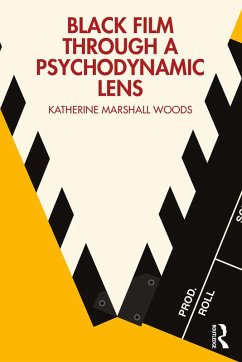In this pioneering book, Katherine Marshall Woods looks at Black cinema from a psychological and psychoanalytic perspective. Focusing on a decade at a time, she charts the development of representation and creative output from the 1980s to the present day. She deftly moves from analyzing depictions of poverty and triumphs to highlighting the importance of cinema in shaping cultural identity while considering racial prejudice and discrimination. Adopting theoretical viewpoints from Freud to bell hooks, Marshall Woods examines the damaging effect on cultural psychology as a result of stereotypical racial tropes, and expertly demonstrates the healing that can be found when one sees oneself represented in an honest light in popular art.
From Do The Right Thing, The Color Purple and Malcolm X to contemporary classics like 12 Years a Slave, Black Panther and American Fiction, this book is an essential read for those interested in the intersection between Psychology, Psychoanalysis, Film Theory, and African American cultural identity.
Dieser Download kann aus rechtlichen Gründen nur mit Rechnungsadresse in A, B, BG, CY, CZ, D, DK, EW, E, FIN, F, GR, HR, H, IRL, I, LT, L, LR, M, NL, PL, P, R, S, SLO, SK ausgeliefert werden.
Grant J. Rich, PhD, President Society for Media Psychology and Technology, Walden University
"Dr. Katherine Marshall Woods' 'Black Film Through a Psychodynamic Lens' is a seminal work that meticulously dissects the psychological motifs embedded within Black cinema alongside pertinent psychological research, highlighting the complexities of race, identity, and culture in film. Through insightful chapter divisions, each dedicated to a specific era of filmmaking, Dr. Marshall Woods adeptly synthesizes the synopses of pivotal films with insightful analyses of the profound psychological themes relevant to the Black community. This book is vital in fostering inclusivity within film anthology, highlighting the underappreciated significance of Black cinema, its psychological influence and its indispensable role in shaping broader cinematic discourse on American life. A compelling must-read for scholars, practitioners, and film enthusiasts alike."
Dr. Tamika Damond, Founder of Believe Psychology Film Festival


